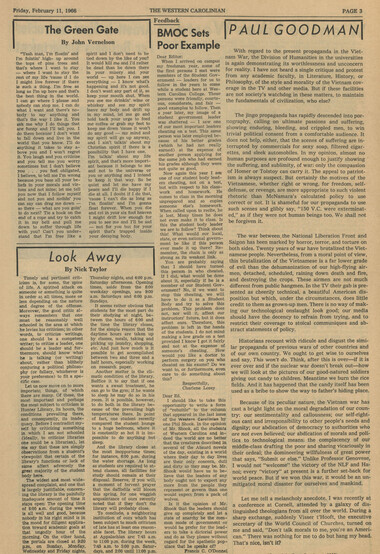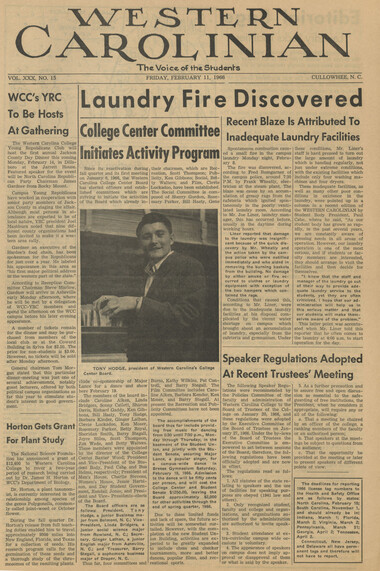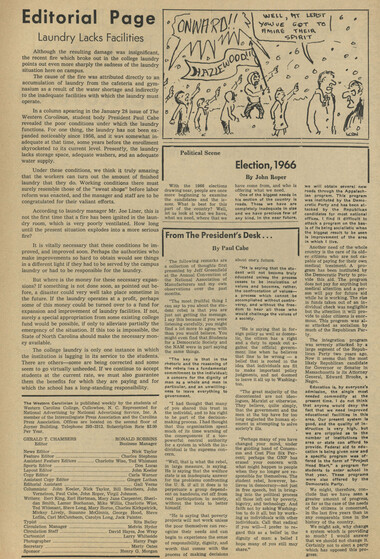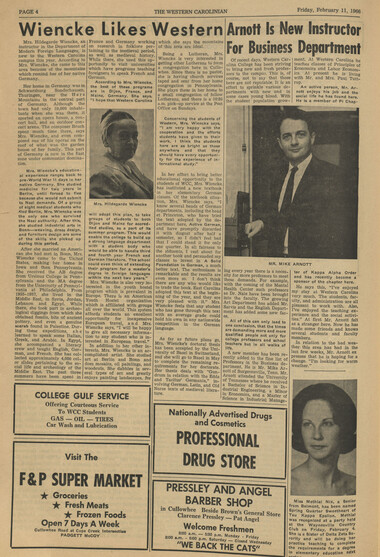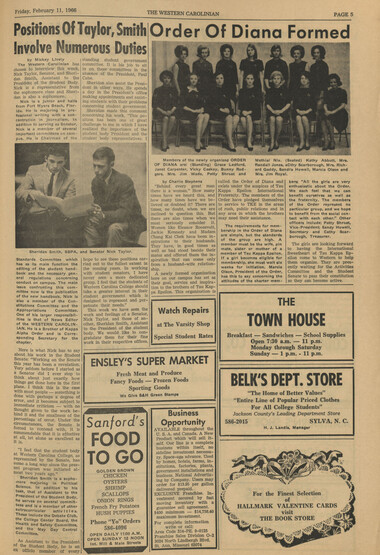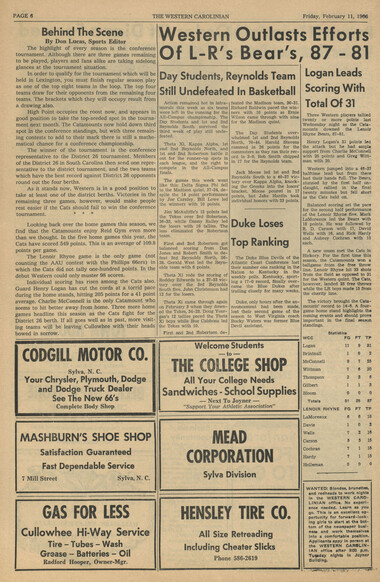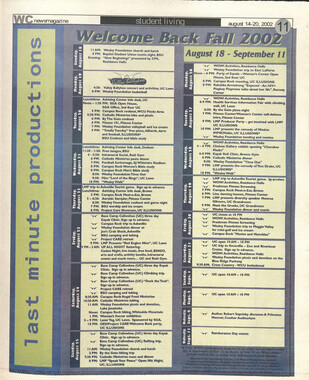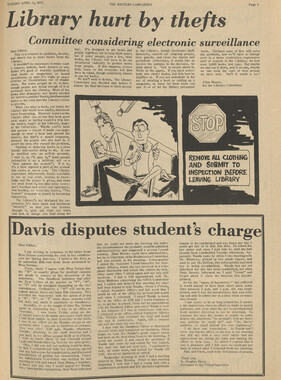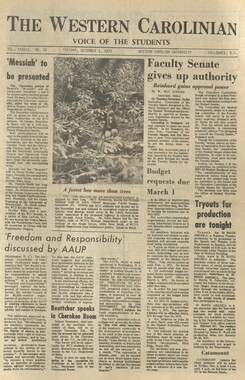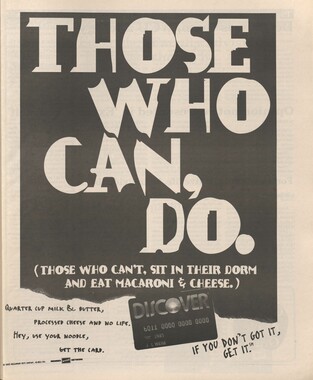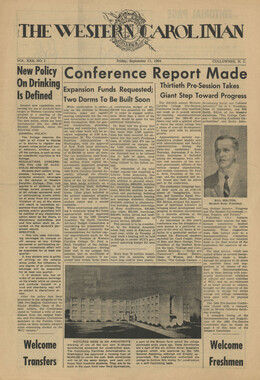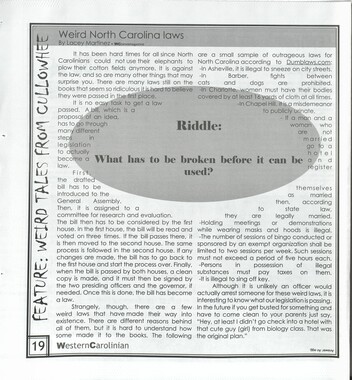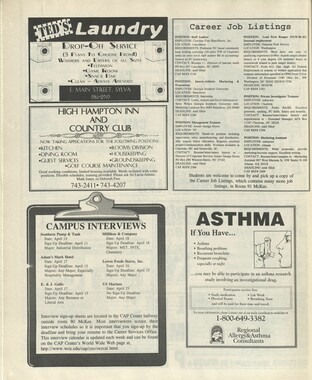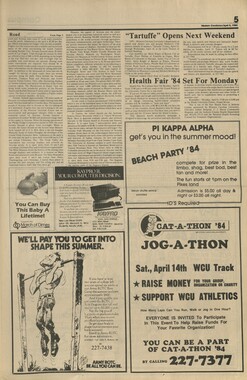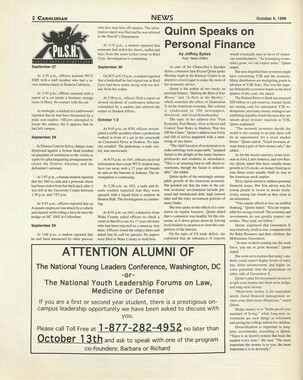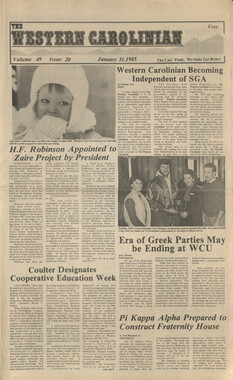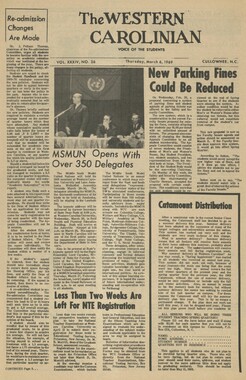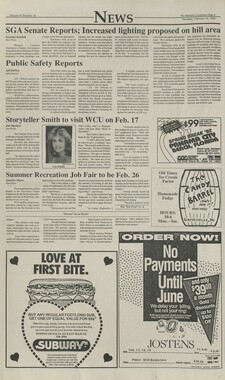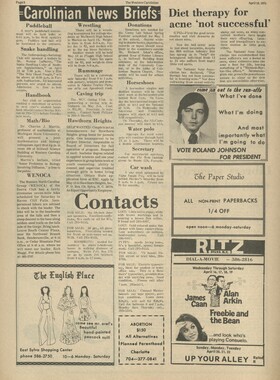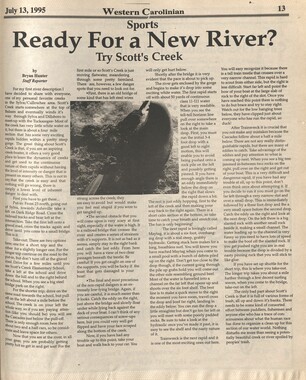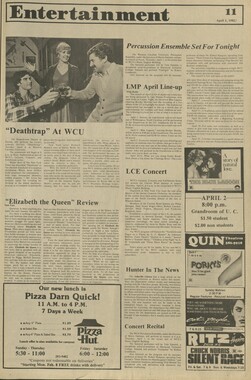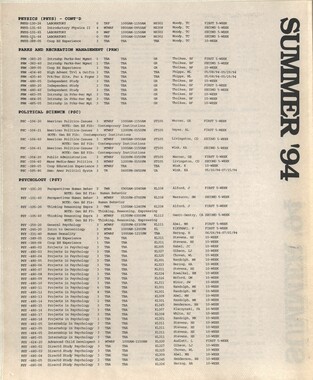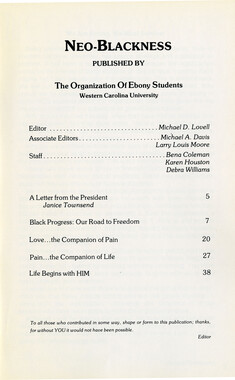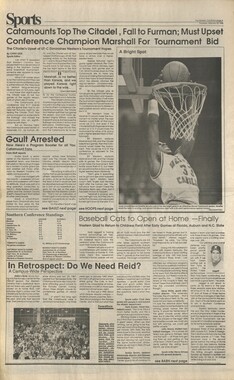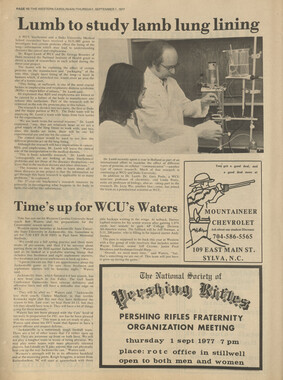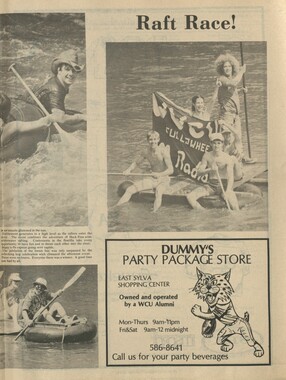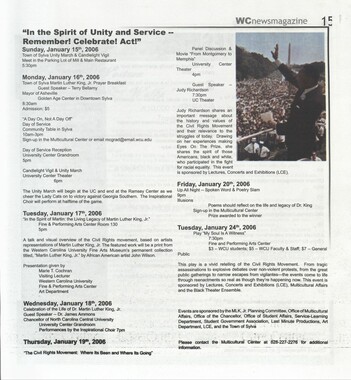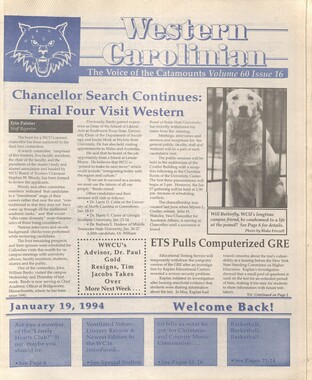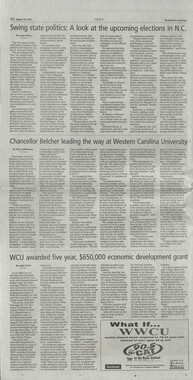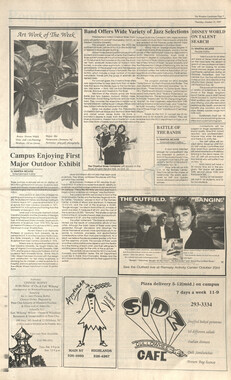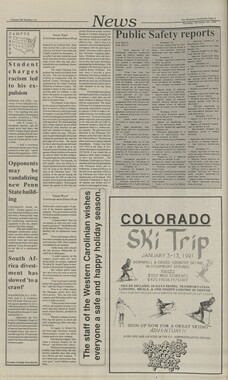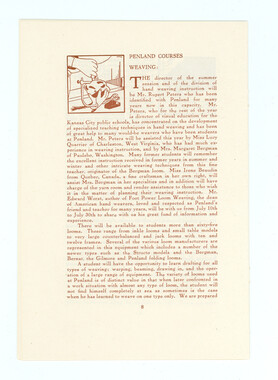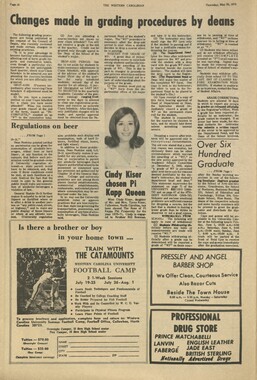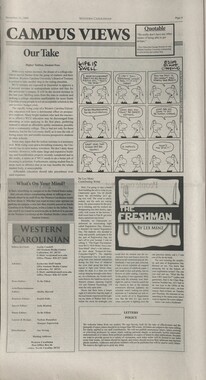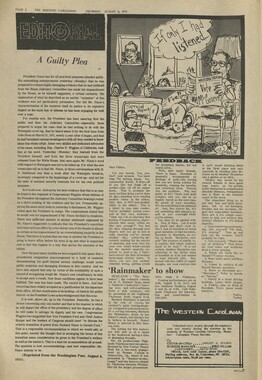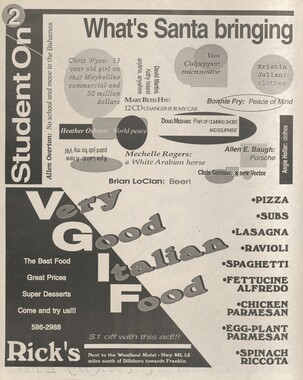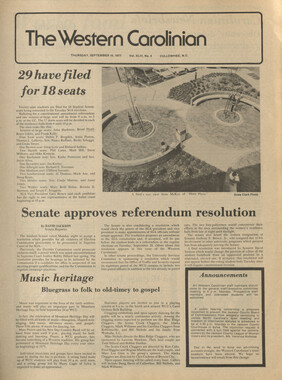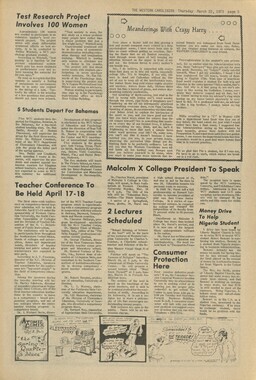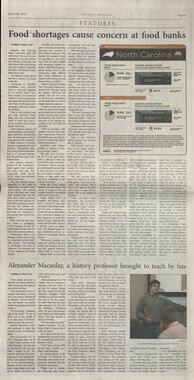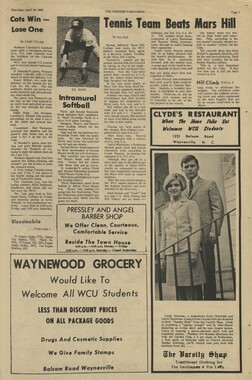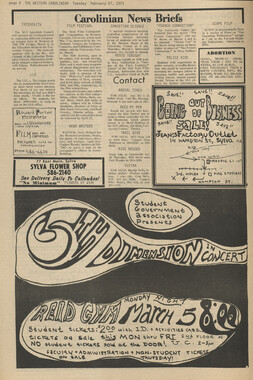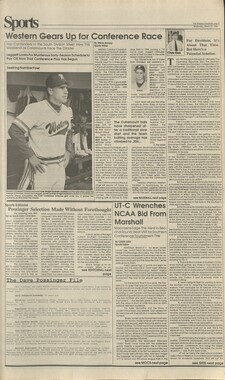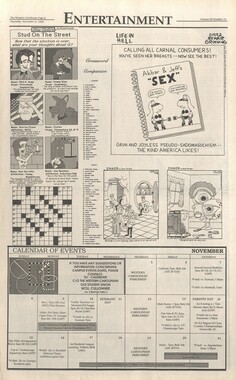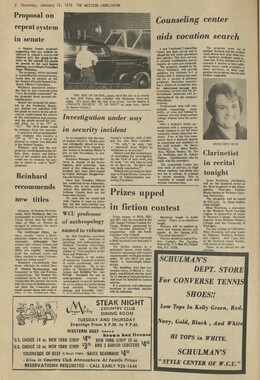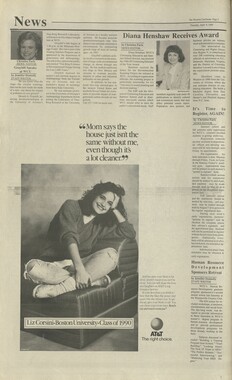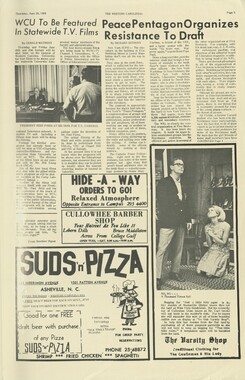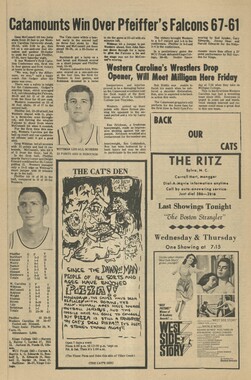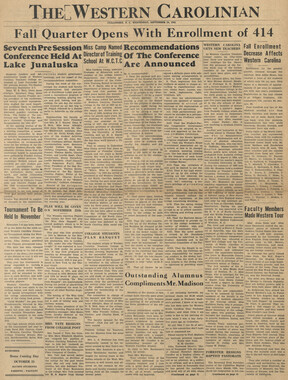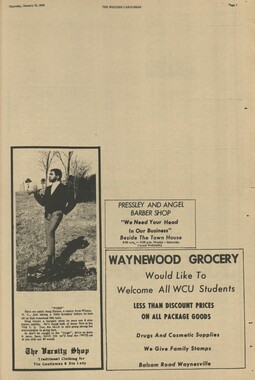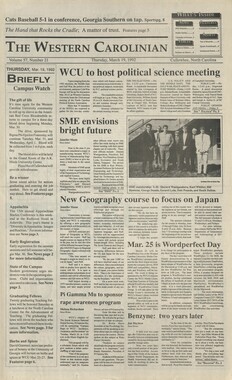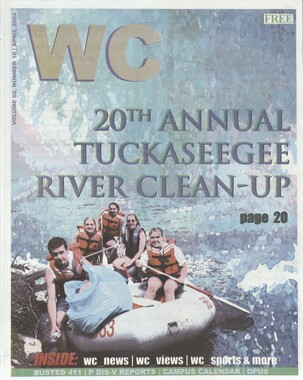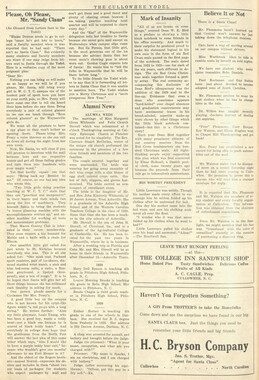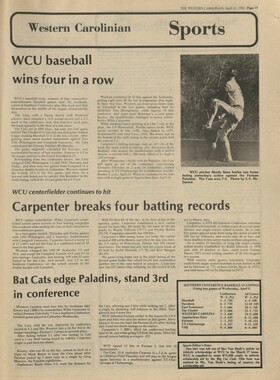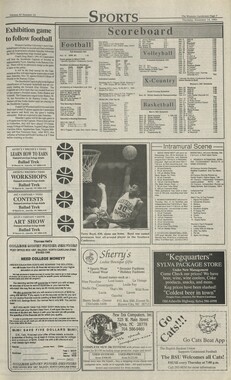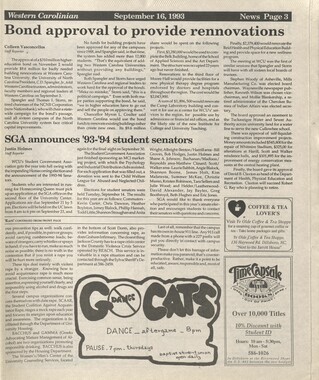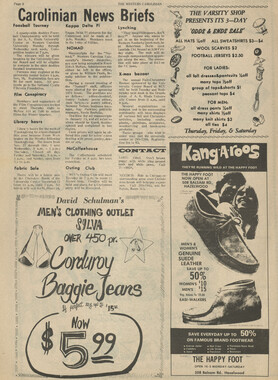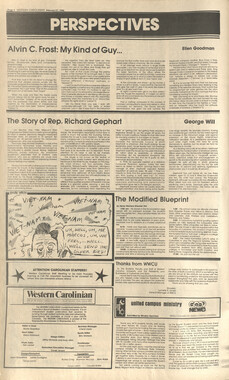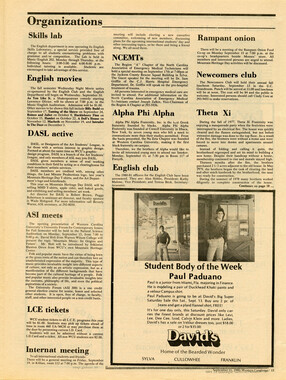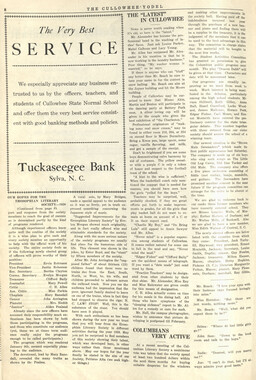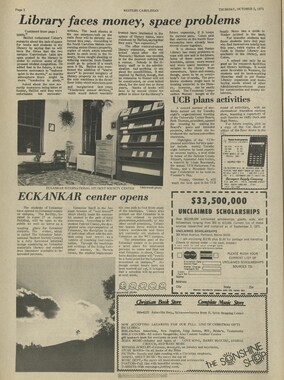Western Carolina University (20)
View all
- Canton Champion Fibre Company (2308)
- Cherokee Traditions (291)
- Civil War in Southern Appalachia (165)
- Craft Revival (1942)
- Great Smoky Mountains - A Park for America (2946)
- Highlights from Western Carolina University (430)
- Horace Kephart (941)
- Journeys Through Jackson (159)
- LGBTQIA+ Archive of Jackson County (85)
- Oral Histories of Western North Carolina (314)
- Picturing Appalachia (6873)
- Stories of Mountain Folk (413)
- Travel Western North Carolina (160)
- Western Carolina University Fine Art Museum Vitreograph Collection (129)
- Western Carolina University Herbarium (92)
- Western Carolina University: Making Memories (738)
- Western Carolina University Publications (2488)
- Western Carolina University Restricted Electronic Theses and Dissertations (146)
- Western North Carolina Regional Maps (71)
- World War II in Southern Appalachia (131)
University of North Carolina Asheville (6)
View all
- Allanstand Cottage Industries (62)
- Appalachian National Park Association (53)
- Bennett, Kelly, 1890-1974 (1463)
- Berry, Walter (76)
- Brasstown Carvers (40)
- Carver, George Washington, 1864?-1943 (26)
- Cathey, Joseph, 1803-1874 (1)
- Champion Fibre Company (233)
- Champion Paper and Fibre Company (297)
- Cherokee Indian Fair Association (16)
- Cherokee Language Program (22)
- Crowe, Amanda (40)
- Edmonston, Thomas Benton, 1842-1907 (7)
- Ensley, A. L. (Abraham Lincoln), 1865-1948 (275)
- Fromer, Irving Rhodes, 1913-1994 (70)
- George Butz (BFS 1907) (46)
- Goodrich, Frances Louisa (120)
- Grant, George Alexander, 1891-1964 (96)
- Heard, Marian Gladys (60)
- Kephart, Calvin, 1883-1969 (15)
- Kephart, Horace, 1862-1931 (313)
- Kephart, Laura, 1862-1954 (39)
- Laney, Gideon Thomas, 1889-1976 (439)
- Masa, George, 1881-1933 (61)
- McElhinney, William Julian, 1896-1953 (44)
- Niggli, Josephina, 1910-1983 (10)
- North Carolina Park Commission (105)
- Osborne, Kezia Stradley (9)
- Owens, Samuel Robert, 1918-1995 (11)
- Penland Weavers and Potters (36)
- Roberts, Vivienne (15)
- Roth, Albert, 1890-1974 (142)
- Schenck, Carl Alwin, 1868-1955 (1)
- Sherrill's Photography Studio (2565)
- Southern Highland Handicraft Guild (127)
- Southern Highlanders, Inc. (71)
- Stalcup, Jesse Bryson (46)
- Stearns, I. K. (213)
- Thompson, James Edward, 1880-1976 (226)
- United States. Indian Arts and Crafts Board (130)
- USFS (683)
- Vance, Zebulon Baird, 1830-1894 (1)
- Weaver, Zebulon, 1872-1948 (58)
- Western Carolina College (230)
- Western Carolina Teachers College (282)
- Western Carolina University (2005)
- Western Carolina University. Mountain Heritage Center (18)
- Whitman, Walt, 1819-1892 (10)
- Wilburn, Hiram Coleman, 1880-1967 (73)
- Williams, Isadora (3)
- Cain, Doreyl Ammons (0)
- Crittenden, Lorraine (0)
- Rhodes, Judy (0)
- Smith, Edward Clark (0)
- Appalachian Region, Southern (2569)
- Asheville (N.C.) (1923)
- Avery County (N.C.) (26)
- Blount County (Tenn.) (195)
- Buncombe County (N.C.) (1672)
- Cherokee County (N.C.) (283)
- Clay County (N.C.) (555)
- Graham County (N.C.) (236)
- Great Smoky Mountains National Park (N.C. and Tenn.) (519)
- Haywood County (N.C.) (3569)
- Henderson County (N.C.) (70)
- Jackson County (N.C.) (4909)
- Knox County (Tenn.) (35)
- Knoxville (Tenn.) (13)
- Lake Santeetlah (N.C.) (10)
- Macon County (N.C.) (420)
- Madison County (N.C.) (215)
- McDowell County (N.C.) (39)
- Mitchell County (N.C.) (132)
- Polk County (N.C.) (35)
- Qualla Boundary (982)
- Rutherford County (N.C.) (76)
- Swain County (N.C.) (2182)
- Transylvania County (N.C.) (270)
- Watauga County (N.C.) (12)
- Waynesville (N.C.) (86)
- Yancey County (N.C.) (72)
- Aerial Photographs (3)
- Aerial Views (60)
- Albums (books) (4)
- Articles (1)
- Artifacts (object Genre) (228)
- Bibliographies (1)
- Biography (general Genre) (2)
- Cards (information Artifacts) (38)
- Clippings (information Artifacts) (191)
- Copybooks (instructional Materials) (3)
- Crafts (art Genres) (622)
- Depictions (visual Works) (21)
- Design Drawings (1)
- Drawings (visual Works) (185)
- Envelopes (73)
- Exhibitions (events) (1)
- Facsimiles (reproductions) (1)
- Fiction (general Genre) (4)
- Financial Records (12)
- Fliers (printed Matter) (67)
- Glass Plate Negatives (381)
- Guidebooks (2)
- Internegatives (10)
- Interviews (815)
- Land Surveys (102)
- Letters (correspondence) (1013)
- Manuscripts (documents) (618)
- Maps (documents) (177)
- Memorandums (25)
- Minutes (administrative Records) (59)
- Negatives (photographs) (6090)
- Newsletters (1290)
- Newspapers (2)
- Notebooks (8)
- Occupation Currency (1)
- Paintings (visual Works) (1)
- Pen And Ink Drawings (1)
- Periodicals (193)
- Personal Narratives (10)
- Photographs (12976)
- Plans (maps) (1)
- Poetry (5)
- Portraits (4568)
- Postcards (329)
- Programs (documents) (181)
- Publications (documents) (2440)
- Questionnaires (65)
- Relief Prints (26)
- Sayings (literary Genre) (1)
- Scrapbooks (282)
- Sheet Music (2)
- Slides (photographs) (402)
- Songs (musical Compositions) (2)
- Sound Recordings (796)
- Specimens (92)
- Speeches (documents) (18)
- Tintypes (photographs) (8)
- Transcripts (322)
- Video Recordings (physical Artifacts) (23)
- Text Messages (0)
- A.L. Ensley Collection (275)
- Appalachian Industrial School Records (7)
- Appalachian National Park Association Records (336)
- Axley-Meroney Collection (2)
- Bayard Wootten Photograph Collection (20)
- Bethel Rural Community Organization Collection (7)
- Blumer Collection (5)
- C.W. Slagle Collection (20)
- Canton Area Historical Museum (2110)
- Carlos C. Campbell Collection (462)
- Cataloochee History Project (64)
- Cherokee Studies Collection (4)
- Daisy Dame Photograph Album (5)
- Daniel Boone VI Collection (1)
- Doris Ulmann Photograph Collection (112)
- Elizabeth H. Lasley Collection (1)
- Elizabeth Woolworth Szold Fleharty Collection (4)
- Frank Fry Collection (95)
- George Masa Collection (173)
- Gideon Laney Collection (452)
- Hazel Scarborough Collection (2)
- Hiram C. Wilburn Papers (28)
- Historic Photographs Collection (236)
- Horace Kephart Collection (861)
- Humbard Collection (33)
- Hunter and Weaver Families Collection (1)
- I. D. Blumenthal Collection (4)
- Isadora Williams Collection (4)
- Jesse Bryson Stalcup Collection (47)
- Jim Thompson Collection (224)
- John B. Battle Collection (7)
- John C. Campbell Folk School Records (80)
- John Parris Collection (6)
- Judaculla Rock project (2)
- Kelly Bennett Collection (1482)
- Love Family Papers (11)
- Major Wiley Parris Civil War Letters (3)
- Map Collection (12)
- McFee-Misemer Civil War Letters (34)
- Mountain Heritage Center Collection (4)
- Norburn - Robertson - Thomson Families Collection (44)
- Pauline Hood Collection (7)
- Pre-Guild Collection (2)
- Qualla Arts and Crafts Mutual Collection (12)
- R.A. Romanes Collection (681)
- Rosser H. Taylor Collection (1)
- Samuel Robert Owens Collection (94)
- Sara Madison Collection (144)
- Sherrill Studio Photo Collection (2558)
- Smoky Mountains Hiking Club Collection (616)
- Stories of Mountain Folk - Radio Programs (374)
- The Reporter, Western Carolina University (510)
- Venoy and Elizabeth Reed Collection (16)
- WCU Gender and Sexuality Oral History Project (32)
- WCU Mountain Heritage Center Oral Histories (25)
- WCU Oral History Collection - Mountain People, Mountain Lives (71)
- WCU Students Newspapers Collection (1920)
- Western North Carolina Tomorrow Black Oral History Project (69)
- William Williams Stringfield Collection (2)
- Zebulon Weaver Collection (109)
- African Americans (390)
- Appalachian Trail (35)
- Artisans (521)
- Cherokee art (84)
- Cherokee artists -- North Carolina (10)
- Cherokee language (21)
- Cherokee pottery (101)
- Cherokee women (208)
- Church buildings (189)
- Civilian Conservation Corps (U.S.) (111)
- College student newspapers and periodicals (2009)
- Dams (107)
- Dance (1023)
- Education (222)
- Floods (61)
- Folk music (1015)
- Forced removal, 1813-1903 (2)
- Forest conservation (220)
- Forests and forestry (1184)
- Gender nonconformity (4)
- Great Smoky Mountains National Park (N.C. and Tenn.) (181)
- Hunting (45)
- Landscape photography (25)
- Logging (119)
- Maps (83)
- Mines and mineral resources (8)
- North Carolina -- Maps (18)
- Paper industry (38)
- Postcards (255)
- Pottery (135)
- Railroad trains (72)
- Rural electrification -- North Carolina, Western (3)
- School integration -- Southern States (2)
- Segregation -- North Carolina, Western (5)
- Slavery (5)
- Sports (452)
- Storytelling (243)
- Waterfalls -- Great Smoky Mountains (N.C. and Tenn.) (66)
- Weaving -- Appalachian Region, Southern (280)
- Wood-carving -- Appalachian Region, Southern (328)
- World War, 1939-1945 (173)
Western Carolinian Volume 30 (31) Number 15
Item
Item’s are ‘child’ level descriptions to ‘parent’ objects, (e.g. one page of a whole book).
-
-
Friday, February 11, 1966 THE WESTERN CAROLINIAN PAGE 3 The Green Gate By John Vernelson "Yeah man, I'm floatin' and I'm folatin' high- up around the tops of pine trees and that's where I want to 6tay — where I want to stay the rest of my life 'cause if I do I might live forever if there is such a thing. I'm free as long as I'm up here and that's the best thing in the world. I can go where I please and nobody can stop me. I can do what I want and there's nobody to say anything and that's the way I like it. You ask me why I do things that are funny and I'll tell you. I do them because I don't want to fall down and live in the world that you know. I'll do anything it takes to stay a- bove you and I won't regret it. You laugh and you criticize and you tell me you worry sometimes but I don't believe you . . . you feel obligated, I believe, to tell me I'm wrong because you base all your beliefs in your morals and virtues and not mine; let me tell you now that I follow myself and not you and nothin' you can say can drag me down — so there — what are you goin' to do next? Tie a hook on the end of a rope and try to catch it in my belt and pull me down to suffer through life with you? Can't you understand that I'm free like a spirit and I don't need to be tied down by the like of you? It would kill me and I'd rather be dead than be down there in your misery and your world — up here I can see everything — I know what's happening and it's not good. I don't want any part of it, so keep your mouth shut. When you see me drinkin' wine or whiskey and see my spirit leave my body and drift up in my mind, let me go and hold back your urge to feed me coffee or grab my feet to keep me down 'cause it won't do any good — my mind and my spirit will go up anyway, and I ain't talkin' about my Christian spirit if there is a possibility that I have one. I'm talkin' about my life spirit, and that's more important because it belongs to me and not to the universe or you or anything and I intend to keep it that way. So be quiet and let me have my peace and I'll die happy if I die at all. I doubt if I do that, 'cause I can't die as long as I'm floatin' and I'm gonna float forever. When you die and rot in your six foot heaven I might drift low enough for you to see me and I'll be sad — not for you but for your spirit that's trapped inside your decaying body. Look Away By Nick Taylor Timely and pertinent criticism is, for some, the spice of life. A spirited attack on someone or something is quite in order at all times, more or less depending on the nature and degree of the offense. Moreover, the good critic always remembers that one must be reasonably well schooled in the area at which he levies his criticism; in other words, to criticize writings, one should be a competent writer; to critize a leader, one should be a leader and furthermore, should know what he is talking (or writing) about, rather than blithely conjuring a political philosophy (or fallacy, whichever is your preference) to fit a specific case. Let us now move on to more important things, of which there are many. Of these, the most important and perhaps the most subject to criticism is Hunter Library, its hours, the conditions prevailing there, and consequently, its inadequacy. Before I contradict myself by criticizing something in which I am not schooled (ideally, to criticize libraries one sould be a librarian), let me say that these are simply observations from a student's viewpoint that certain of the library's functions or lack of same affect adversely the great majority of the student body here. The widest and most widespread complaint, and one that is largely justifiable, concerning the library is the painfully inadequate amount of time it stays open: The opening time of 8:00 ajn. during the week is all well and good, because nobody in his right mind is in the mood for diligent application toward academic goals at that ungodly hour of the morning. On the other hand, the portals are closed at 930 p.m. on Sunday, Monday, Wednesday and Friday nights, Thursday nights, and 4:00 p.m. Saturday afternoons. Opening times, aside from the 8:00 weekday openings, are 9:00 a.m. Saturdays and 6:00 p.m. Sundays. It seems rather obvious that students for the most part do their studying at night, between the hours of 6:00 and the time the library closes, for the simple reason that the daytime hours are taken up by classes, meals, taking and picking up laundry, shopping, etc. And just how much is it possible to get accomplished between two and three and a half hours, especially working on research paper. Another matter is the climatic condition of the library. Suffice it to say that if one wants a sweat treatment, he can go to the gym; if he wants to sleep he may do so in his room. It is possible, however, to do both in the library because of the prevailing high temperatures there. In point of fact, one student recently compared the student lounge to a huge bedroom, where it is constantly so hot it is impossible to do anything but sleep. And the library closes at the most inopportune times; for instance, 6:00 p.m. during the water shortage. As long as students are required to attend classes, all facilities for study should remain at their disposal. Reserve, if you will, a moment of fervent prayer that the daffodils will bloom this spring, for one waggish acquaintance of ours recently noted that if they don't the library will probably close. To conclude, a neighboring institution of ours which has been subject to much criticism of late has at least one reasonable facet. The library hours at Appalachian are: 7:45 a.m. to 11:00 pjn. during the week, 7:45 ajn. to 5:00 pm. Saturdays, and 2:00 until 11:00 p.m. Feedback BMOC Sets Poor Example Dear Editor: When I arrived on campus my freshman year, some of the first persons I met were members of the Student Government — leaders for us to follow in the years to come while a student here at Western Carolina College. These persons were friendly, courteous, considerate, and fair — good examples to follow. Then a year later, my image of a student government leader was shattered — I saw one of our most important leaders cheating on a test. This same person was later employed because of his better grades (which he had not really earned) at the expense of another person applying for the same job who had earned his grades although they were not quite as good. Now again this year I see one of our student body leaders cheating, not on a test, but with respect to his class- work and homework. He comes to class in the morning unprepared and so copies someone else's homework. When called upon to recite, he is lost. Many times he does not even make it to class. Is this the student body leader we are to follow? Think about this! What would our local, state, or even national government be like if this person ever made it up there? Remember, the chain is only as strong as its weakest link. You are probably saying that I should have turned this person in who cheated. If I did, what would be done about it, especially if he is a member of our Student Government? No, if we want to stop this cheating, we will have to do it as a Student Body and try to solve this problem. This problem does not, nor will it, affect our instructors' future, but it does affect ours. Therefore, this problem is left in the hands of the students. I do not mind making a low grade on a test provided I know I got it fairly and not at the expense of someone's cheating. How would you like a doctor to perform surgery on you who cheated on his exams? Do we want to, or furthermore, even care to do something about this? Respectfully, Charlene Losey Dear Ed. I should like to take this opportunity to write a form of "rebuttle" to the column that appeared in the last issue of the Western Carolinian by one Phil Shook. In the opinion of Mr. Shook, all the students of Western Carolina and indeed the world are no better that the creatures described in several of the Absurd novels of the day, existing in a world where their day to day lives are their only concern, dull and dirty as they may be. Mr. Shook would have us to believe that the leaders of any body ought not to expect any more from the people they represent or govern than one would expect from a pack of wolves. Is it the opinion of Mr. Shook that the leaders should give up completely and let a state of anarchy be the common mode of government or would he prefer for the leaders to take a dictorial power and do as they please without regard for the apathetic populace that he speaks of? Francis C. O'Donnel PAUL GOODMAN With regard to the present propaganda in the Vietnam War, the Division of Humanities in the universities is again demonstrating its worthlessness and unconcern for reality. I have not heard a single critique and protest from any academic faculty, in Literature, History, or Philosophy, of the style and morality of the Vietnam coverage in the TV and other media. But if these facilities are not society's watchdog in these matters, to maintain the fundamentals of civilization, who else? The jingo propaganda has rapidly descended into pornography, calling on ultimate passions and suffering, showing enduring, bleeding, and crippled men, to win trivial political consent from a comfortable audience. It does not help, either, that the scenes of suffering are interrupted by commercials for sexy soap, filtered cigarettes, and sleek automobiles. In my opinion, almost no human purposes are profound enough to justify showing the suffering, and sublimity, of war; only the compassion of Homer or Tolstoy can carry it. The appeal to patriotism is always suspect. But certainly the motives of the Vietnamese, whether right or wrong, for freedom, self- defense, or revenge, are more appropriate to such violent rhetoric than McNamara's calculated policy to use correct or not. It is shameful for our propaganda to use such scenes and glibly say, "150 V.C. were exterminated," as if they were not human beings too. We shall rot be forgiven it. The war between the National Liberation Front and Saigon has been marked by horror, terror, and torture on both sides. Twenty years of war have brutalized the Vietnamese people. Nevertheless, from a moral point of view, this brutalization of the Vietnamese is a far lower grade of evil than the dehumanization of our high-flying airmen, detached, scheduled, raining down death and fire, and destroying the crops. These airmen are not much different from public hangmen. In the TV their gab is presented as cheerily technical, a beautiful American disposition but which, under the circumstances, does little credit to them as grown-up men. There is no way of making our technological onslaught look good; our media should have the decency to refrain from trying, and to restrict their coverage to stoical communiques and abstract statements of policy. Historians recount with ridicule and disgust the similar propaganda of previous wars of other countries and of our own country. We ought to get wise to ourselves and say, This won't do. Think, after this is over—if it is ever over and if the nuclear war doesn't break out—how we will look at the pictures of our good-natured soldiers giving out candy to children. Meantime we burn the rice fields. And it has happened that the candy itself has been used as a bribe to show the way to father's hiding place. Because of its peculiar nature, the Vietnam war has cast a bright light on the moral degradation of our country: our sentimentality and callousness; our self-right- ous cant and irresponsibility to other people's needs and dignity; our abdication of democracy to authorities who are not even believed; our abdication of morals and politics to technological means; the complacency of our middle-class drafting the poor and sharing vicariously in their ordeal; the domineering willfulness of great power that says, "Submit or else." Unlike Professor Genovese, I would not "welcome" the victory of the NLF and Hanoi; every "victory" at present is a further set-back for world peace. But if we won this war, it would be an unmitigated moral disaster for ourselves and mankind. Let me tell a melancholy anecdote. I was recently at a conference at Cornell, attended by a galaxy of distinguished theologians from all over the world. During a sharp exchange, suddenly Visser t'Hooft, the executive secretary of the World Council of Churches, turned on me and said, "Don't talk morals to me, you're an American." There was nothing for me to do but hang my head. That's nice, isn't it?
Object
Object’s are ‘parent’ level descriptions to ‘children’ items, (e.g. a book with pages).
-
The Western Carolinian is Western Carolina University’s student-run newspaper. The paper was published as the Cullowhee Yodel from 1924 to 1931 before changing its name to The Western Carolinian in 1933.
-
